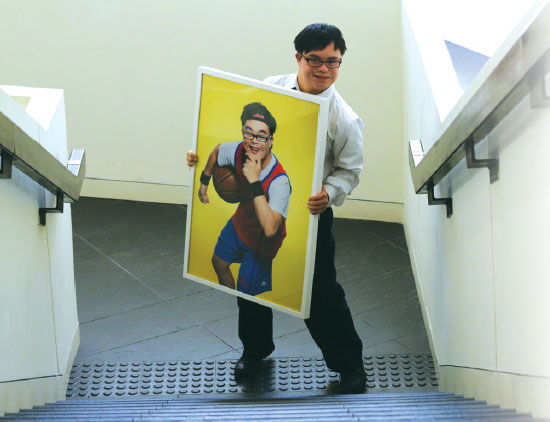Down, but not out
Updated: 2015-01-14 06:03
By Sylvia Chang(HK Edition)
|
|||||||
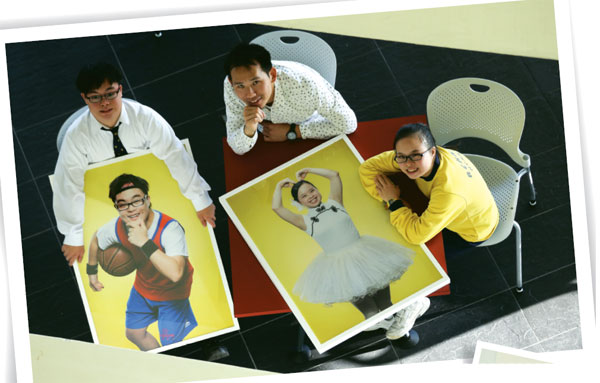
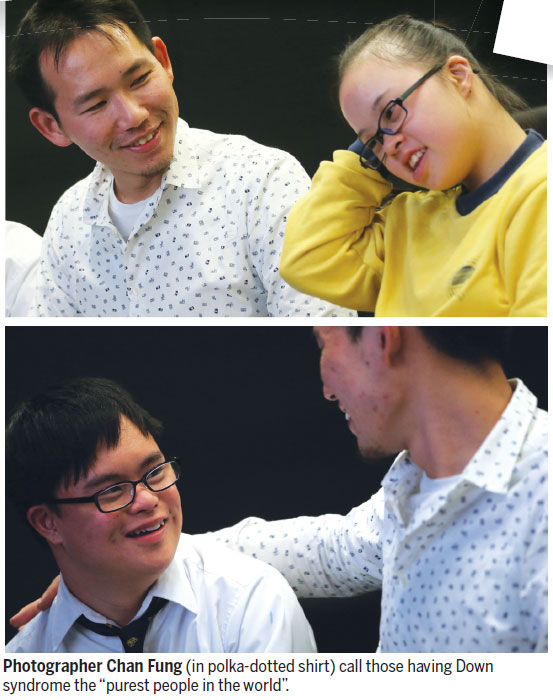
At a photo exhibition dedicated to young people with Down syndrome, Sylvia Chang meets a few heroes, and their parents, who have been coping with the condition for years together.
Frank Chan Fung calls them the "purest people in the world". As he trains his camera on them, one by one, his 23 models, between 11 and 30, try doing an impromptu performance of what they do best - playing the guitar, dancing a ballet number, taking a shot at football, displaying a cool martial arts move or singing a riff from Cantonese opera. Common to them is a bright yellow background, and an even brighter smile on their faces.
They are people with Down syndrome in varying degrees. Some of them also have congenital health problems, including heart disease, strabismus, loss of hearing, and so on. Chan, a fresh photography graduate from School of Creative Media at City University of Hong Kong, is exhibiting his work based on their lives beginning Jan 13 at the Hong Kong Cultural Centre. The idea is to have the public to give more care to those afflicted with the disease.
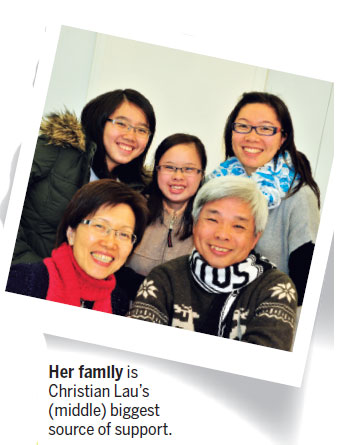
Down syndrome is caused by abnormal chromosomes. About one in 600 children is born with Down syndrome. In Hong Kong 2,000 to 3,000 people have the condition, according to Hong Kong Down Syndrome Association. People with Down syndrome appear to have a round face, flat nasal bridge and a tongue with a coarse, grainy texture. They have mild or moderate intellectual disabilities and have weak muscle function.
A swan in motion
Christian Lau is almost 20, but has the intelligence of a 10-year-old. She is positive about life, and generally enthusiastic about music and dance. In a white ballet dress, she appears like a swan in Chan's photo.
"I'd like to become a dancing assistant," Christian Lau says without batting an eyelid when asked about her dream.
In 2012 Lau made it to Grade 8 of the ballet program offered by Royal Academy of Dance in the UK. She has been at it since she was 4, and is already a winner of several awards.
Her father, Vincent Lau, understandably, is very protective of his talented daughter.
"The awards are just for encouragement. If dancing can make her as happy as she is, that's enough," Vincent Lau said, showing a family photo, in which Christian, the second child of the family, is laughing, flanked by her two sisters. Nothing seems amiss.
When asked what she found the most difficult about dancing, Lau replied, promptly, "lacing up shoes".
It's a common difficulty people with Down syndrome tend to face. Even simple tasks such as buttoning up could seem arduous because of weak motor skills.
"We never thought she would ever be able to dance when she was born," said Lau's mother Mak Miu-ling. It took her a while to accept that her child was differently abled. "We kept asking why it had to be us? Did we do something wrong?"
Now, of course, she is quite the proud mother. Even as Mak talked to us, her daughter, sitting quietly by her side, patted her mother's shoulders, as if to console her. When Mak turned her head and their eyes met, it was moment worth capturing and putting up in a frame.
My hero, Michael Jordan
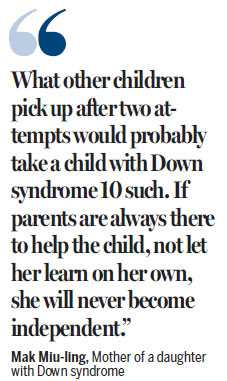
Nathan Leung, 17, is also born with Down syndrome. He is one of twin brothers. His father David Leung sent Nathan to a local international school so that he might have more opportunities to interact with people of different backgrounds.
Nathan Leung is a basketball fan. He also likes singing and writing songs. "Everyday I'm happy, and my favorite thing changes every day," says Nathan, confidently, in fluent English. His dream is to become a basketball superstar, like Michael Jordan.
"He's pretty active. But to have such ambitions is highly optimistic," Nathan's father, David Leung, said. "Sadly you can only talk with him about simple issues. He can't have deeper interactions with people."
"I'm still struggling with the fact that my boy has Down syndrome," Leung says, with a laugh. "In different stages of his life, from childhood to adolescence, I worry about different issues."
"I am most worried about how he would take care of himself, especially after I pass on," says David Leung. A shadow of despair passes across the face of this middle-aged man, who had been, so far, trying to make light of his situation.
Mak, Christian Lau's mother, says the biggest challenge for her is to learn to "let go".
"It is true that children with Down syndrome need special care from their parents. But for parents knowing when and how to let go is also important. The big difference (between children with disabilities and those without) is in the time spent in learning. What other children pick up after two attempts would probably take a child with Down syndrome 10 such. If parents are always there to help the child, not let her learn on her own, she will never become independent," said Mak. After 20 years of sharing a space with her daughter, Mak appears to have become an expert in taking care of children with special needs.
"Learn on my own," Christian repeated after her mother. She is good at catching and reproducing words. Also, with a little bit of assistance from her sisters, she can ride a bike. Sometimes they take her on a boat ride and even to ride horses.
Looking at a photo showing her riding a horse, Christian bursts into a peal of laughter. Right now she is learning to use public transport and to buy stuff from the local store.
"No fear," she said, her eyes gleaming brightly as she spoke.
Contact the writer at sylvia@chinadailyhk.com
|
Nathan Leung dreams of becoming a basketball superstar. Edmond Tang / China Daily |
(HK Edition 01/14/2015 page7)
